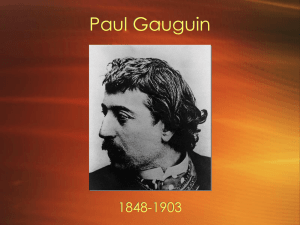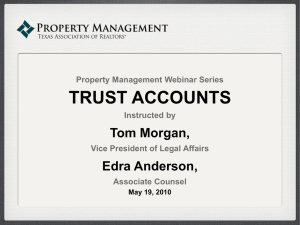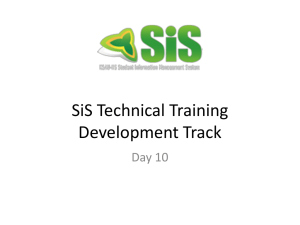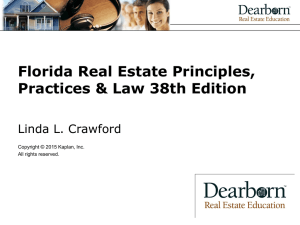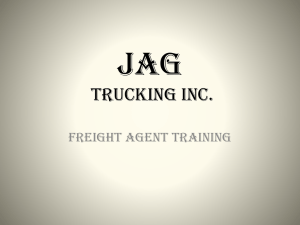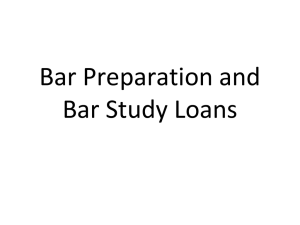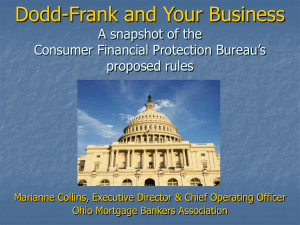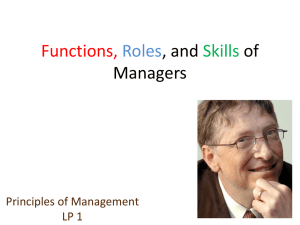California Mortgage Loan Brokering & Lending - PowerPoint
advertisement
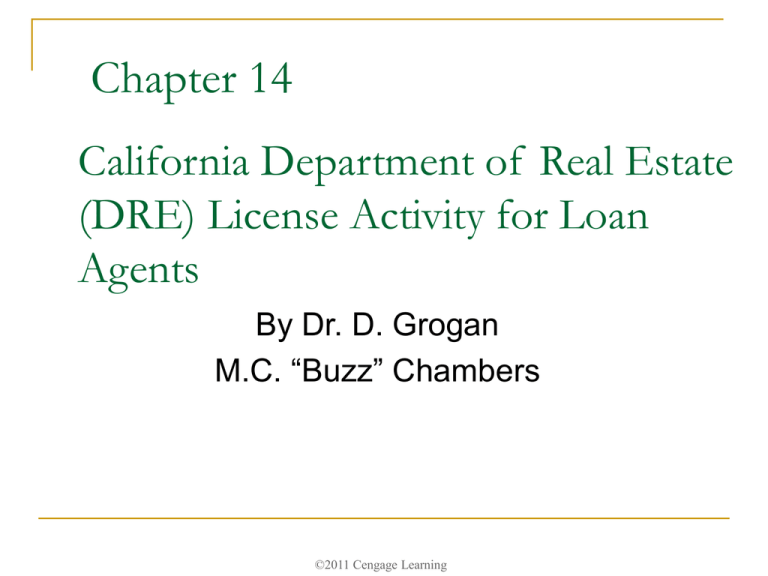
Chapter 14 California Department of Real Estate (DRE) License Activity for Loan Agents By Dr. D. Grogan M.C. “Buzz” Chambers ©2011 Cengage Learning Preview Some activities fall under the DOC, but the majority of loan activity in California falls under the DRE, which regulates licensees who make loans secured on real property. This chapter discusses the loan business that requires a DRE state license, including obtaining and maintaining a DRE license. Both the State of California and the federal government have enacted laws regarding mortgage loan originators (MLO). Under the Federal S.A.F.E. Act the single license record for each MLO are outlined and discussed. Of the 10 most common violations found in DRE audits, trust fund handling and recordkeeping are the most troublesome. This chapter discusses the legal requirements for licensing in various states other than California. ©2011 Cengage Learning Student Learning Outcomes 1. Outline the activities that do not require a DRE license. 2. List activities that require a DRE broker license. 3. Describe the DRE license requirements for the salesperson and broker license. 4. Identify topics and differentiate between the B&P Code and the DRE Real Estate Commissioner’s Code of Regulations. 5. Discuss the most common DRE violations. 6. Differentiate between loan broker license laws prior to January 1, 2010 and those required after that date. 7. Outline the required conduct for licensed activities as a residential mortgage loan originator (MLO) for the new 2010 and 2011 license laws. ©2011 Cengage Learning 14.1 Department of Real Estate (DRE) License Law Activities that do NOT require a DRE license: 1. 2. 3. 4. 5. Participation in market analyses, such as obtaining comparable sales prices or loan amounts recorded against similar properties. Review of government reports, such as zoning, coastal commission, or environmental findings and seeking disclosure, as described in Chapter 5. Report on items of interest in trade publications, such as FNMA underwriting guidelines or obtaining blank, current lending forms, such as the loan application (1003) described in Chapter 6. Participation in office training sessions on loan processing or servicing. Participation in sales meetings of the loan agents, describing Reg. Z advertising regulations, as described in Chapter 2. ©2011 Cengage Learning Activities that do NOT require a DRE license (cont) 6. Keeping records on loans, including principal, interest, taxes, or insurance. 7. Observing certain phases of office management, such as personnel and files and typing rate sheets that are approved by the broker. 8. Contact with the title company regarding vesting of a prospective buyer, as described in Chapter 8. 9. Contact with the title company about property information that is of public record, such as square footage of land and improvements and tax liens. 10. Contact with real estate licensees to obtain recent sales data and financing terms. ©2011 Cengage Learning Activities that do NOT require a DRE license (cont) 11. Help in the preparation of advertising copy, such as to place or cancel advertising, as described in Chapter 2. 12. Contact with DVA, FHA, FNMA, or FHLMC to obtain underwriting guidelines and instructions. 13. Contact with the DRE to obtain license information and forms. 14. Telephone answering assignments (cannot quote price or rates) to take messages for loan agents. ©2011 Cengage Learning LOAN LICENSE EXEMPTIONS Loan correspondent: Conducts loans for only ONE California chartered savings & loan Owner: When carrying back a loan in a sale Employees of institutional lender, insurance company or credit union Corporate officer performing regular duties with no extra compensation for real estate acts Receiver in a bankruptcy Individual who collects 10 or less loans under $40,000 in one year Those who fall under: Food & Agricultural Code; Cemetery loans under Health & Safety Code; and Institutions under Federal Home Loan Bank Board ©2011 Cengage Learning (DRE) License Law (cont) Activities that DO require a Broker License: 1. Soliciting borrowers for loans and soliciting lenders for loans 2. Negotiating loans 3. Collecting payments for loans secured on real property or performing loan servicing for borrowers or for lenders in connection with loans on real property 4. Selling or offering to sell a promissory note secured collaterally by a lien on real property ©2011 Cengage Learning Activities that DO require a Broker License: 5. Buying or offering to buy a promissory note secured by a lien on real property. 6. Exchanging or offering to exchange a promissory note secured directly by real property. 7. Performing services for the promissory note holder secured by a lien on real property. ©2011 Cengage Learning (DRE) License Law (cont) License Requirements DRE is under the California Business and Transportation Agency A. • • B. Governor appoints DRE Commissioner Attorney General is legal council for DRE DRE law falls under Business and Professions Code ©2011 Cengage Learning DRE Licenses: DRE Broker receives compensation for: Soliciting borrowers or lenders of trust notes Negotiates loans on real property Collects payments for loans on real property Buys, sells, exchanges notes secured by a lien DRE Salesperson Acts as an employee of a DRE broker May be Independent contractor for IRS taxes May receive compensation only from their employing broker ©2011 Cengage Learning DRE licensee must: Qualify to be licensed Pass state examination Have reached 18th birthday Submit licensee fee Submit live-scan fingerprints & pay fee Not have felony criminal record to warrant denial ©2011 Cengage Learning DRE licensee must (cont): Obtain state license Salesperson: Complete RE Principles, RE Practice & 1 additional course Pass state exam of 150 questions with 70% Broker: Complete 8 courses (may be the 3 listed above) Pass state exam of 200 questions with 75% Experience: 2 yrs as salesperson; or 1 yr as salesperson with Associate degree; or 4 year degree or law degree ©2011 Cengage Learning DRE licensee must (cont): Complete statutory course(s) prior to applying for state exam. Pass DRE examination Have electronic fingerprints taken Pay fees Complete 45 hours of continuing education for each four-year license renewal period. ©2011 Cengage Learning DRE license Employment Agreement Name the parties as shown on the DRE license Date the signed contract Definition and description of activities of the licensee requiring broker supervision Duties of each party Compensation detail ©2011 Cengage Learning DRE license law http://www.dre.ca.gov Notify DRE commissioner within 5 days of: Employment between broker and salesperson Change in mailing address of licensee License renewal Discontinuation of salesperson employment Certificate of salesperson employment ©2011 Cengage Learning DRE license no longer valid when: Licensee fails to complete 45 hours of continuing education and submit proof to the DRE Commissioner every 4 years. Employing broker fails to complete 45 hours continuing education for license renewal. Restricted license or special requirements set by the DRE Commissioner. Suspended or revoked license. ©2011 Cengage Learning Business office: Fictitious name DRE Commission will NOT approve DBA if: Misleading Constitutes false advertising Implies a partnership when such does not exist Implies a corporation that is not in legal existence Includes any licensed salesperson’s name Is a name previously used by any revoked licensee ©2011 Cengage Learning 14.2 DRE Broker Supervision Broker supervision: Broker may delegate to another licensed broker if written agreement specifies the delegation of document review. May delegate authority to licensed salesperson if salesperson has 2 of last 5 years full-time experience with the same designed broker; and, a written agreement specifying duties. ©2011 Cengage Learning 14.3 California Code & Regulations for Licensees Real Estate Law References Business & Professions Code Real Estate law: Part 1 licensing Sections 10000 thru 10580 Real Estate law: Part 2 Regulation of transactions Sections 11000 thru 11200 ©2011 Cengage Learning 14.4 Review of Instruments Timeline Compliance As Agent or Principal Broker review must be performed regularly Status must be disclosed to all principals & agents As Lender Licensee may not represent to be a lender unless true Requires written authorization from lender ©2011 Cengage Learning Document Requiring Review Mtg loan disclosure statement (borrower) Mtg loan disclosure statement (good faith estimate) RESPA TIL FNMA form 1003 Loan Application Credit authorization Lead-based paint, termite report, etc. ECOA Signed appraisal report ARM, FHA, DVA disclosures TDS Prelim & title report Gift letter ©2011 Cengage Learning Common DRE Violations 1. Retention of records (B&P, Section 10148) 2. Use of false or fictitious name (Regulation 2731) - DBA 3. Trust fund records to be maintained (Regulation 2831) 4. Separate record for each beneficiary or transaction (Regulation 2831.1) 5. Trust account reconciliation (Regulation 2831.2) 6. Trust fund handling for multiple beneficiary—Trust fund shortage (2832.1) 7. Trust fund handling (Regulation 2832) 8. Trust account withdrawals (Regulation 2834) 9. Commingling (B&P, Section 10145/Regulation 2835) 10. Written disclosure statement (B&P, Section 10240) ©2011 Cengage Learning 14.5 California Finance Code Under the California Finance Code Department of Corporations (DOC) Law Governor appoints Corporation Commissioner Commissioner oversees activities of Corporations ©2011 Cengage Learning California Finance Lender (CFL) Licensed by DOC for real or personal property loans. Makes real property loans for over $5,000 Must have $25,000 minimum net worth People who work under DOC broker are employees. ©2011 Cengage Learning California Health & Safety Code Residential Mortgage Loan Report (RML) Exempt: If assets are $10 million or less Exempt: If broker is exempt under Home Mortgage Disclosure Act (HMDA) of 1975 Files report annually If broker performed 12 or more transactions Must report transactions of $500,000 or more ©2011 Cengage Learning DOC Lenders Commercial Finance Lender: loans of $5,000 or more for commercial property. California Residential Mortgage Lending Act (CRMLA): 1-4 unit residential requires annual Mortgage Loan Report. ©2011 Cengage Learning DOC licensee as a CRMLA broker: Buys or sells loans to or from institutional lenders. Handles loan servicing Receives compensation for processing and underwriting. ©2011 Cengage Learning Difference between DRE & DOC Licensing A. DRE allows licensed salespersons to handle loans DRE requires licensee to pass a state exam DOC allows only the broker to solicit loans DOC requires no state examination Financial Reports B. DRE has no special expenses for the loan broker DOC requires all CFL licensees to pay annual administrative costs to run the agency. ©2011 Cengage Learning Difference between DRE & DOC Loans: C. DRE licensee only makes loans secured by a lien on real property. DOC makes loans on both real and personal property. DOC has secured and unsecured consumer loans. ©2011 Cengage Learning Difference between DRE & DOC D. E. Referral Fees A. DRE broker may pay a fee to another DRE broker B. DOC may compensate anyone C. DOC may pay a DRE broker referral fee D. DRE may not pay a DOC broker referral fee Client Funds DRE broker not required to have trust account DOC broker must have a client trust account ©2011 Cengage Learning Difference between REAL and PERSONAL Property Lender Real property includes improvements Real property may become personal property Loan collateral may include trade fixtures ©2011 Cengage Learning 14.6 S. A. F. E. Act Secure And Fair Enforcement Part of the Housing & Economic Recovery Act of 2009 (Public Law 110-289). License law for each Mortgage Loan Originator (MLO). Requires within 30 days of loan activity from Jan 31, 2010, DRE licensed broker report all activity in making, arranging or servicing any loan secured by real property for residential & commercial. ©2011 Cengage Learning S. A. F. E. Act License qualifications Processing fees are non-refundable. Individual must pass National and California Unique State component written exam as of 2010. Individual must complete 20 hours of pre-license education. DRE licensee may have already met this requirement-DRE web site maintains the info. Individual must: (1) file an online MLO license endorsement application. (2) pay license fee. (3) submit live-scan fingerprints. (4) allow authorized credit report from consumer reporting agency. ©2011 Cengage Learning 14.7 License Laws State License Type State License Type Alabama Broker Hawaii Broker Arizona Broker Idaho Broker Arkansas Broker Illinois Residential Loan California Finance Broker/Lender Indiana Loan Broker Colorado Mortgage Broker Iowa Broker Connecticut 2nd Broker Kansas 1st Broker Kansas 2nd Broker Delaware Broker Kentucky Broker FHA - HUD Loan Correspondent (Mini Eagle) Louisiana Broker FHA - HUD Non-Supervised Lender (Full Eagle) Maine Credit Services Florida Broker and Broker Business Maryland Broker Georgia Broker Massachusetts Broker ©2011 Cengage Learning 14.7 License Laws (cont) State Michigan Michigan Minnesota Mississippi Missouri Montana Montana Nebraska Nevada New Hampshire New Jersey New Jersey New Mexico New York North Carolina North Dakota Ohio License Type 1st Broker 2nd Broker Originator Broker Broker 1st Broker 2nd Broker Broker Broker Broker 1st Broker 2nd Broker Loan Company Broker Broker/Lender Money Broker 1st State Oklahoma Oklahoma Oregon Pennsylvania Pennsylvania Rhode Island South Carolina South Dakota Tennessee Texas Utah Utah Vermont Virginia Washington ©2011 Cengage Learning License Type Broker Supervised Lender Broker 1st Broker 2nd Broker Broker Broker Broker Broker Broker 1st broker 2nd Notification Broker Broker Broker
